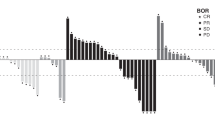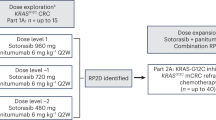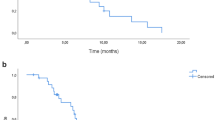Abstract
Targeted agents directed at VEGF, such as bevacizumab, and EGFR, such as cetuximab and panitumumab, have become part of the standard treatment of metastatic colorectal cancer. Only a subset of patients seem to benefit from such treatment, and varying results have been observed when different lines of treatment are used in combination with different cytotoxic drugs. Preclinical and early clinical data have shown promising results for the combination of anti-VEGF and anti-EGFR treatment. However, two recent phase III trials, CAIRO2 and PACCE, have shown a detrimental effect of adding an anti-EGFR antibody to standard chemotherapy plus bevacizumab. We discuss issues that may explain these unexpected results.
This is a preview of subscription content, access via your institution
Access options
Subscribe to this journal
Receive 12 print issues and online access
$209.00 per year
only $17.42 per issue
Buy this article
- Purchase on Springer Link
- Instant access to full article PDF
Prices may be subject to local taxes which are calculated during checkout
Similar content being viewed by others
References
Hurwitz, H. et al. Bevacizumab plus irinotecan, fluorouracil, and leucovorin for metastatic colorectal cancer. N. Engl. J. Med. 350, 2335–2342 (2004).
Kabbinavar, F. F. et al. Combined analysis of efficacy: the addition of bevacizumab to fluorouracil/leucovorin improves survival for patients with metastatic colorectal cancer. J. Clin. Oncol. 23, 3706–3712 (2005).
Giantonio, B. J. et al. Bevacizumab in combination with oxaliplatin, fluorouracil, and leucovorin (FOLFOX4) for previously treated metastatic colorectal cancer: results from the Eastern Cooperative Oncology Group study E3200. J. Clin. Oncol. 25, 1539–1544 (2007).
Saltz, L. B. et al. Bevacizumab in combination with oxaliplatin-based chemotherapy as first-line therapy in metastatic colorectal cancer: a randomized phase III study. J. Clin. Oncol. 26, 2013–2019 (2008).
Sobrero, A. F. et al. EPIC: phase III trial of cetuximab plus irinotecan after fluoropyrimidine and oxaliplatin failure in patients with metastatic colorectal cancer. J. Clin. Oncol. 26, 2311–2319 (2008).
Van Cutsem, E. et al. Cetuximab and chemotherapy as initial treatment for metastatic colorectal cancer. N. Engl. J. Med. 360, 1408–1417 (2009).
Bokemeyer, C. et al. Fluorouracil, leucovorin, and oxaliplatin with and without cetuximab in the first-line treatment of metastatic colorectal cancer. J. Clin. Oncol. 27, 663–671 (2009).
Amado, R. G. et al. Wild-type KRAS is required for panitumumab efficacy in patients with metastatic colorectal cancer. J. Clin. Oncol. 26, 1626–1634 (2008).
Karapetis, C. S. et al. K-ras mutations and benefit from cetuximab in advanced colorectal cancer. N. Engl. J. Med. 359, 1757–1765 (2008).
Lievre, A. et al. KRAS mutations as an independent prognostic factor in patients with advanced colorectal cancer treated with cetuximab. J. Clin. Oncol. 26, 374–379 (2008).
Di Nicolantonio, F. et al. Wild-type BRAF is required for response to panitumumab or cetuximab in metastatic colorectal cancer. J. Clin. Oncol. 26, 5705–5712 (2008).
Tol, J. et al. BRAF mutation in metastatic colorectal cancer. N. Engl. J. Med. 361, 98–99 (2009).
Tol, J. et al. Chemotherapy, bevacizumab, and cetuximab in metastatic colorectal cancer. N. Engl. J. Med. 360, 563–572 (2009).
Ciardiello, F. et al. Antiangiogenic and antitumor activity of anti-epidermal growth factor receptor C225 monoclonal antibody in combination with vascular endothelial growth factor antisense oligonucleotide in human GEO colon cancer cells. Clin. Cancer Res. 6, 3739–3747 (2000).
Tonra, J. R. et al. Synergistic antitumor effects of combined epidermal growth factor receptor and vascular endothelial growth factor receptor-2 targeted therapy. Clin. Cancer Res. 12, 2197–2207 (2006).
Saltz, L. B. et al. Randomized phase II trial of cetuximab, bevacizumab, and irinotecan compared with cetuximab and bevacizumab alone in irinotecan-refractory colorectal cancer: the BOND-2 study. J. Clin. Oncol. 25, 4557–4561 (2007).
Cunningham, D. et al. Cetuximab monotherapy and cetuximab plus irinotecan in irinotecan-refractory metastatic colorectal cancer. N. Engl. J. Med. 351, 337–345 (2004).
Hecht, J. R. et al. A randomized phase IIIB trial of chemotherapy, bevacizumab, and panitumumab compared with chemotherapy and bevacizumab alone for metastatic colorectal cancer. J. Clin. Oncol. 27, 672–680 (2009).
Tol, J. et al. A randomised phase III study on capecitabine, oxaliplatin and bevacizumab with or without cetuximab in first-line advanced colorectal cancer, the CAIRO2 study of the Dutch Colorectal Cancer Group (DCCG). An interim analysis of toxicity. Ann. Oncol. 19, 734–738 (2008).
Antonacopoulou, A. G. et al. EGFR, HER-2 and COX-2 levels in colorectal cancer. Histopathology 53, 698–706 (2008).
Duff, S. E. et al. Vascular endothelial growth factors and receptors in colorectal cancer: implications for anti-angiogenic therapy. Eur. J. Cancer 42, 112–117 (2006).
Scartozzi, M. et al. Arterial hypertension correlates with clinical outcome in colorectal cancer patients treated with first-line bevacizumab. Ann. Oncol. 20, 227–230 (2009).
Allain, P. et al. Early biotransformations of oxaliplatin after its intravenous administration to cancer patients. Drug Metab. Dispos. 28, 1379–1384 (2000).
Bukowski, R. M. et al. Randomized phase II study of erlotinib combined with bevacizumab compared with bevacizumab alone in metastatic renal cell cancer. J. Clin. Oncol. 25, 4536–4541 (2007).
Cohen, E. E. et al. Erlotinib and bevacizumab in patients with recurrent or metastatic squamous-cell carcinoma of the head and neck: a phase I/II study. Lancet Oncol. 10, 247–257 (2009).
Dickler, M. N. et al. A phase II trial of erlotinib in combination with bevacizumab in patients with metastatic breast cancer. Clin. Cancer Res. 14, 7878–7883 (2008).
Ince, W. L. et al. Association of k-ras, b-raf, and p53 status with the treatment effect of bevacizumab. J. Natl Cancer Inst. 97, 981–989 (2005).
Author information
Authors and Affiliations
Corresponding author
Ethics declarations
Competing interests
C. J. A. Punt is on the speakers' bureau for Roche and receives grant/research support from Merck Serono, Pfizer and Roche. J. Tol declares no competing interests.
Rights and permissions
About this article
Cite this article
Punt, C., Tol, J. More is less—combining targeted therapies in metastatic colorectal cancer. Nat Rev Clin Oncol 6, 731–733 (2009). https://doi.org/10.1038/nrclinonc.2009.168
Issue Date:
DOI: https://doi.org/10.1038/nrclinonc.2009.168
This article is cited by
-
CAFs secrete CXCL12 to accelerate the progression and cisplatin resistance of colorectal cancer through promoting M2 polarization of macrophages
Medical Oncology (2023)
-
Exosome-transmitted FOSL1 from cancer-associated fibroblasts drives colorectal cancer stemness and chemo-resistance through transcriptionally activating ITGB4
Molecular and Cellular Biochemistry (2023)
-
Anti-tumor effects of P-LPK-CPT, a peptide-camptothecin conjugate, in colorectal cancer
Communications Biology (2022)
-
Granulin epithelin precursor promotes colorectal carcinogenesis by activating MARK/ERK pathway
Journal of Translational Medicine (2018)
-
Decreased mitochondrial priming determines chemoresistance of colon cancer stem cells
Cell Death & Differentiation (2014)



